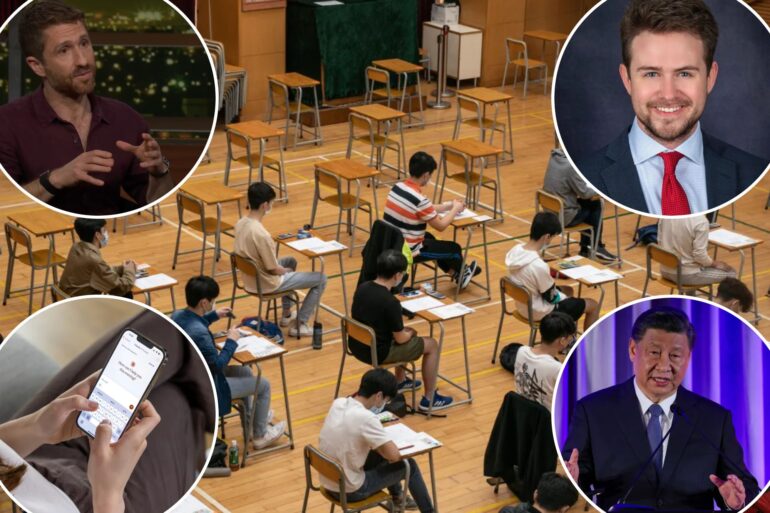🔴 Website 👉 https://u-s-news.com/
Telegram 👉 https://t.me/usnewscom_channel
China now turns off AI for the whole country during exam weeks.
That’s because the Chinese Communist Party knows their youth learn less when they use artificial intelligence. Surely, President Xi Jinping is reveling in this leg up over American students, who are using AI as a crutch and missing out on valuable learning experiences as a result.
It’s just one of the ways China protects their youth, while we feed ours into the jaws of Big Tech in the name of progress.
When Chinese students sat for gaokao exams — intense four day college placement tests — in June, AI companies Alibaba, ByteDance, Tencent, and Moonshot all shut off useful features for would-be cheaters, including a photo-upload function that solves exam questions for you.
“China is a generally techno-optimist country,” Scott Singer, a tech scholar at the Carnegie Endowment for National Peace, told The Post
“That said, the government will clamp down when it thinks technology will cause societal harm and when certain uses run counter to the country’s interests. And China’s government has shown it’s not afraid to clamp down on its tech companies when it believes the circumstances require it.”
All Chinese users who attempted to use the feature during exam days received an error message, according to Bloomberg.
None of the companies that modified services made any public statement about the freeze in service, and none responded to request for comment from The Post. Moonshot could not be reached for comment.
Center for Humane Technology co-founder Tristan Harris said on Real Time with Bill Maher earlier this month that the move is “actually really smart, because what it means is that students during the year can’t just rely on AI to do all their homework.”
Harris, a former design ethicist at Google turned Big Tech whistleblower, says that American kids, by contrast, are suffering learning losses from AI: “We are seeing kids who are in a race. If the other kids in their class are cheating… they’re gonna start cheating and using AI to outsource their thinking.”
The science backs this up. A June MIT study suggests that AI degrades critical thinking skills. Researchers found that people who wrote essays with AI had less brain activity while doing work, retained less of the content, and outsourced more and more of their workload to AI over time.
“It’s a fight every assignment,” Murphy Kenefick, a Nashville high school literature teacher, told The Post. “I’ve caught it about 40 times, and who knows how many other times they’ve gotten away with it.”
AI optimists often argue that, if we pump the breaks on AI, China will just surpass us. But Harris argues that whatever country learns to better regulate the new tech will be the real victor — because they’ll have smarter citizens.
“What’s guiding this is the race between the US and China — if we don’t build it, we’re just gonna lose to the country that will,” he explained. “But this is a mistake, because [the winner is] actually who’s better at governing the technology.”
He added, “We beat China to social media. Did that make us stronger or did that make us weaker?”
Harris is right. The US might have been cutting edge on rolling out platforms like Instagram and YouTube, but we were also cutting edge in hooking our kids and turning them into doom-scrolling zombies.
China ultimately came out with the heroin of social media: TikTok. But, unlike us, they’ve always taken great care to protect their populace from harm.
The CCP exported TikTok — with its twerking trends and dangerous challenges, while giving their own citizens a modified, less addictive, and more pro-social version.
Douyin, the Chinese iteration, has voice reminders and interruptions for users who scroll for too long. Teens under 14 are limited to only 40 minutes a day and are shown inspirational content, like science experiments, patriotic videos, and educational content, according to Harris.
Douyin also censors information deemed counter to national interests, including content from economists who were critical of the Chinese economy, according to the New York Times.
TikTok declined to comment on this matter.
Unlike the American government, the CCP wields authoritarian control over their populace and their tech companies. America shouldn’t copy them wholesale.
But China is cunning, clever, and forward-looking. If they’ve decided that endless scrolling on TikTok and homework help from AI is bad for their kids, it’s probably bad for ours too.
“China is correct to take the risks of AI seriously, not just for education but for society as a whole,” Anthony Aguirre, co-Founder and Executive Director of the Future of Life Institute, told The Post.
“The United States will have very different ways of addressing this, but the answer can’t be to do nothing. Lawmakers must step up now with clear safeguards to protect children and society from repeating the same mistakes we did with social media.”
As we unleash AI — which has the potential to be the most transformative modern technology ever invented — onto the world, we must take great care to do so cautiously, especially when it comes to our youth.
If we fail to, the next generation in China may leave their tech-addled counterparts in America in the dust. Perhaps the real arms race is the long game.

